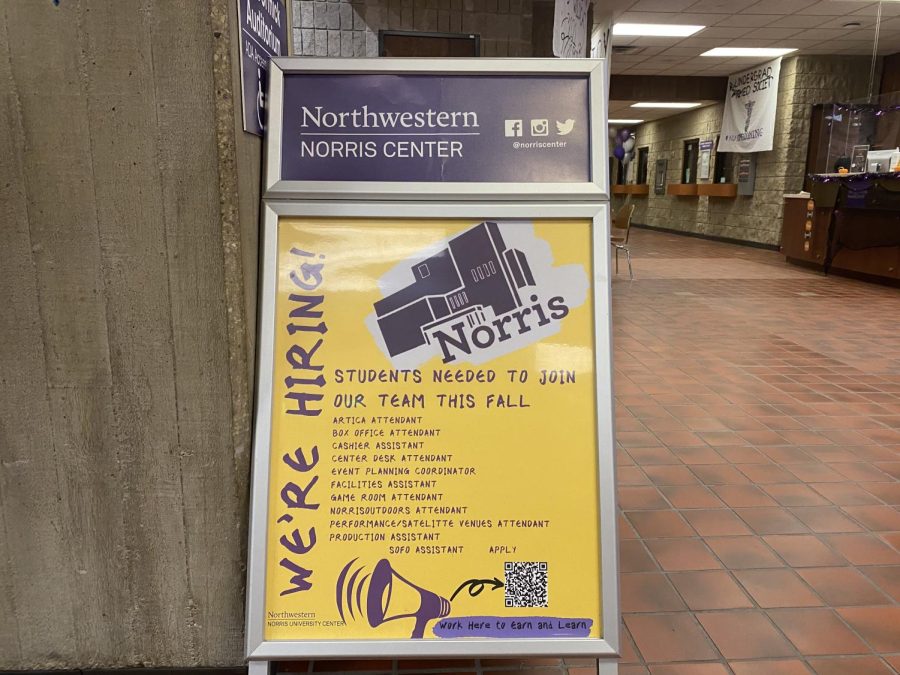Work-study jobs on campus go unfilled, mirroring nationwide labor shortage
Shannon Tyler/The Daily Northwestern
A hiring sign in Norris University Center. According to Northwestern’s work-study page, many work-study positions are still hiring.
November 15, 2021
Work-study positions are going unfilled across campus as some students report they don’t want to add a part-time job to their list of responsibilities this year.
Places like Norris University Center, Henry Crown Sports Pavilion and Aquatics Center, and University, Mudd and Deering Libraries are still looking to hire students, according to Northwestern’s work-study webpage.
The campus student worker shortage reflects a nationwide labor shortage amid the pandemic. The U.S. Bureau of Labor Statistics’s most recent 2021 report found there were 10.4 million job openings and about 7.4 million people unemployed.
Economists disagree about its cause. Some attribute the shortage to unemployment benefits, some to health concerns because of the pandemic, and others to a nationwide shift in attitudes toward working. Many labor advocates say it’s not a labor shortage at all, but rather a shortage of strong wages and good working conditions.
Some NU underclassmen who are eligible for work study said they don’t think they can balance classes and a social life with an on-campus job. Others said they want to settle into college before adding a job to their list of responsibilities.
Henry Crown is dealing with a smaller staff than usual, according to Henry Crown Facilities Supervisor Clint Phillips. In a typical year, the facility hires 150 to 200 students. This year, it’s hired about 100. He said many staff members didn’t return this year, and as a result, he’s struggling to attract students willing to join an understaffed workplace.
Clint said work-study employers typically avoid overscheduling, but with a diminished workforce, this practice often leaves work-study shifts open. These students are typically the ones enforcing COVID-19 policies like mask mandates. So when no one’s on the clock, the policies staff would usually monitor may go unenforced, Phillips said.
Weinberg junior Andy Bergeron, a returning work-study staff member at Henry Crown, said the lack of employees has made his experience this year different, but not necessarily worse. This year, he said he has more freedom to choose which shifts he works.
“My freshman year … there wasn’t too much room to pick up (shifts),” Bergeron said. “But I have noticed this year that I could work pretty much any shift I want.”
Weinberg freshman Nate Hanrahan, a QuestBridge scholar, said he could afford not to work because of his financial aid package. He said he wants to adjust to being a college student without the added stress of a part-time job.
“I’m making sure that I am meeting all my social needs and my academic needs,” Hanrahan said. “I figured since I didn’t immediately need the extra money, I feel pretty comfortable doing what I’m doing right now.”
For Weinberg freshman Esther Tang, family prompted her decision not to work. Tang said she and her mom decided the adjustment to college would be best without the added weight of a job.
Both Hanrahan and Tang said they would consider working later on in college and possibly in the coming quarters. But taking the time to settle into college life is a priority they’re not willing to sacrifice.
“I definitely think that if I had a job right now, like some of my classmates who are struggling to balance school work along with the hours that they’re working, I would too,” Tang said. “I’m … very thankful that I’m able to not have to work, and I recognize that’s a part of my privilege that I’m able to do that.”
Email: [email protected]
Twitter: @shnnnmrynn
Related Stories:
— Need to Know: Your guide to navigating work-study
— Despite compensation efforts, work-study communication falters


